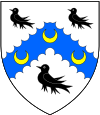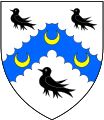Edward Watson, Viscount Sondes facts for kids
Quick facts for kids
Edward Watson
|
|
|---|---|
| Viscount Sondes | |
| Coat of arms |  |
| Reign | George I |
| Born | 3 July 1686 |
| Died | 20 March 1722 (aged 35) Kensington Gravel Pits |
| Buried | 31 March 1722 Rockingham church |
| Noble family | Watson |
| Spouse(s) | Catherine Tufton |
| Issue |
|
| Father | Lewis Watson, 1st Earl of Rockingham |
| Mother | Catherine Sondes |
| Occupation | politician |
Edward Watson, Viscount Sondes (born 3 July 1686 – died 20 March 1722) was an important British politician. He was known as a Whig and served in the House of Commons for many years. He lived at Lees Court in Kent and Park Place in London.
Contents
Who Was Edward Watson?
Edward Watson was the oldest son of Lewis Watson, 1st Earl of Rockingham. His mother was Catherine Sondes. He came from a noble family.
Early Life and Education
Edward was born on 3 July 1686. When he was 16, he went to Merton College, Oxford University in 1703. This is where he started his higher education. In 1707, he traveled abroad to Germany. This was a common way for young noblemen to learn about the world.
His Political Journey
Edward Watson returned from Germany in 1708. He was soon elected as a Member of Parliament (MP) for Canterbury. He was part of the Whig political group.
What Was a Whig?
In Edward Watson's time, British politics had two main groups: the Whigs and the Tories.
- The Whigs generally supported Parliament's power. They also often supported religious freedom for Protestants.
- The Tories usually supported the power of the King more. They also tended to favor the Church of England.
Edward's Time in Parliament
As an MP, Edward Watson took part in important discussions.
- In 1709, he suggested that the Queen should consider getting married again.
- He also supported allowing people from a region called Palatine to become British citizens.
- He helped create a law to limit how long people mourned publicly. This was because long mourning periods were hurting the silk trade in Canterbury.
- He voted against a doctor named Sacheverell in a big trial. Because of this, he lost his seat in the next election in 1710.
However, he was soon back in Parliament. In 1713, he became the MP for New Romney. When his father became an Earl in 1714, Edward was given the title Viscount Sondes. In 1718, he joined the Opposition. This meant he was against the current government. In 1719, he became a Gentleman of the Bedchamber to the Prince of Wales. This was an important role in the royal household.
Family Life
Edward Watson married Catherine Tufton on 21 March 1709. She was the oldest daughter of Thomas Tufton, 6th Earl of Thanet. They had four children together:
- Lewis Watson, 2nd Earl of Rockingham
- Thomas Watson, 3rd Earl of Rockingham
- Edward Watson
- Catherine Watson, who married Edward Southwell. She had children.
His Later Years and Legacy
Edward Watson died on 20 March 1722 from a lung illness called consumption (now known as tuberculosis). He passed away at Kensington Gravel Pits in London. He was buried on 31 March 1722 at Rockingham church. He died two years before his father.
His wife, Catherine, and her sisters later inherited the Barony of Clifford title in 1729. After some time, the barony was eventually passed down to Edward Watson's grandson, Edward Southwell, 20th Baron Clifford, in 1775.
Images for kids
 | Isaac Myers |
 | D. Hamilton Jackson |
 | A. Philip Randolph |


